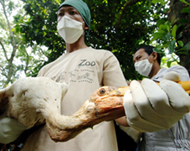Bird flu threatens to spread in Europe
Lack of proper water and sewerage in Romania can produce Europe’s first human bird flu cases, experts said on Friday, while an Iraqi who died in January was confirmed as the country’s second victim.

Officials said the disease had infected chickens in Egypt for the first time and there were fears of further outbreaks in birds in Germany and Hungary.
Azerbaijan and Slovenia reported more cases of the deadly H5N1 bird flu and the strain was probably present in a dead duck found in eastern France. Tests were being carried out on suspect birds from Greece.
The H5N1 virus remains mainly a disease of poultry, but it has infected 169 people, killing at least 91 in Asia and the Middle East since 2003.
The World Health Organisation (WHO) has warned that the virus could spark a pandemic that could kill millions of people around the world if it mutates into a form that spreads easily between humans.
An Iraqi man who died last month was confirmed as the country’s second human case of H5N1 infection, the WHO said; but tests on 14 other people proved negative.
In Bucharest, WHO and local experts warned that Romania, where nearly half the population live in rural areas with poor water and sewerage, faced a definite risk that the disease could claim its first human victims in Europe.
Critical situation
 |
|
Romania has found bird flu in 31 |
Romania has found bird flu in 31 villages since first detecting the virus in October; but the domestic birds were culled swiftly and no human cases have been reported so far.
“The situation is critical. So far we can say we have been lucky that we had no cases of bird flu in humans,” said Adrian Streinu-Cercel, head of Romania‘s main virus laboratory.
“It’s not enough to force people to wash their hands, you have to give them the means to do it,” he added.
“The likelihood that some kids in Romania come in contact and play with sick or dead birds is not zero,” said Guenael Rodier, a WHO expert.
As fears of the disease’s spread to humans grew, a top WHO official said while the world had spent more than $3 billion to stockpile anti-virals against bird flu, it is not investing enough to develop an influenza pandemic vaccine.
Klaus Stohr, WHO special adviser on influenza pandemic vaccine development, said that while preliminary results from several clinical trials looked “promising”, much more work was needed.
Encouraging results
 |
|
Indonesia has reported 18 |
But an Australian company, CSL Ltd., reported that small doses of a vaccine against H5N1 had achieved “encouraging” preliminary results in a trial involving healthy adults.
“Firstly, we can confirm it is actually possible to vaccinate humans against this bird flu virus using existing technology,” said Terry Nolan, the principal investigator.
The findings were released as Anton Apriyantono, Indonesian agriculture minister, said the number of bird flu cases among humans in his country had risen this year.
“Bird flu cases in humans (in Indonesia) are increasing in 2006, but the outbreak in poultry is decreasing. It indicates that the virus is spreading fast,” he said.
Indonesia has had 18 confirmed deaths from bird flu while eight other confirmed sufferers have survived.
As a senior WHO official in Egypt confirmed that H5N1 had been found in birds in three areas of the country, Germany said it was likely to report more cases in the coming days.
Bird flu in Germany
 |
|
Germany expects more cases of |
Bird flu arrived in Germany on Tuesday when two wild swans discovered dead on a Baltic Sea beach were found to be infected with H5N1.
“It is to be expected that more positive finds will be made,” Horst Seehofer, agriculture minister, said.
New cases of H5N1 in Russia have forced authorities to cull more than half a million chickens in the south of the country, the World Animal Health Organisation said.
In Italy, poultry producers say demand for chicken meat has plummeted by 70 % since news last Saturday that H5N1 had been found in swans in the south of the country.
The Italian agriculture minister said on Friday he would urge the government to push through financial support measures for chicken farmers hit by the bird flu crisis even if this meant breaching European Union rules on state aid.
In Nigeria, Olusegun Obasanjo, the country’s president, opened his chicken farm for bird flu testing to encourage farmers to be transparent about any suspected outbreak of the disease.
Panic selling of suspect birds by some farmers has contributed to the spread of bird flu in Africa‘s most populous country, where H5N1 was confirmed on 8 February.